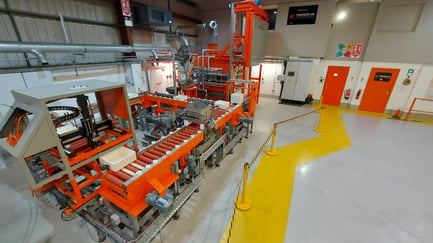Share this
Why is Silicon Carbide popular in Kilns
by Therser UK on 09-May-2023 16:50:20
-
High temperature stability: Silicon carbide has excellent thermal stability and can withstand extremely high temperatures. It can maintain its structural integrity even at temperatures above 1,600°C (2,912°F). This makes it suitable for use in kilns, which often operate at high temperatures.
-
High thermal conductivity: Silicon carbide has a high thermal conductivity, which means it can effectively transfer heat. This property allows for efficient heat distribution within the kiln, ensuring uniform temperature distribution and reducing hotspots.
-
Low thermal expansion: Silicon carbide has a low coefficient of thermal expansion, which means it expands and contracts minimally with changes in temperature. This characteristic helps to minimize thermal stress and prevents cracking or damage to the kiln structure during heating and cooling cycles.
-
Chemical inertness: Silicon carbide is highly chemically inert, meaning it does not readily react with most chemicals or gases. This property is particularly beneficial in kiln applications where corrosive or reactive substances are present. Silicon carbide can withstand exposure to acids, alkalis, and other harsh chemicals without significant degradation.
-
Mechanical strength: Silicon carbide is a very hard and durable material with excellent mechanical strength. It can withstand mechanical stresses, such as weight loads or vibrations, without easily breaking or deforming. This strength is crucial for maintaining the structural integrity of the kiln during operation.
-
Abrasion resistance: Silicon carbide is highly resistant to wear and abrasion, making it suitable for kiln applications where there may be contact between the material being processed and the kiln lining. It can withstand the erosive effects of abrasive materials and extend the lifespan of the kiln lining.

Overall, the combination of high temperature stability, thermal conductivity, low thermal expansion, chemical inertness, mechanical strength, and abrasion resistance makes silicon carbide a reliable and efficient material for kilns. It helps to ensure proper heat transfer, temperature control, and long-term durability in various industrial processes, such as ceramics manufacturing, metal heat treatment, and glass production.
Share this
- Company News (90)
- Battery Materials (41)
- kiln (37)
- fabrication (29)
- Alloy (27)
- Furnace (27)
- Welding (16)
- Industrial Kilns (15)
- Battery (13)
- Ceramic Kilns (13)
- Processes (13)
- alloy fabrication (13)
- Shuttle Kilns (12)
- RTO’s (11)
- Vacancies (11)
- Hydrogen (10)
- Therser UK (9)
- Tunnel Kiln (9)
- Refractory (8)
- Therser (8)
- Wellman Furnaces (8)
- Brickwork (7)
- Case Studies (7)
- Afterburners (6)
- Fibre Lining (6)
- electric (6)
- Almor Wellman (5)
- thermal engineers (5)
- Biochar (4)
- Exhibition (4)
- Pyrolysis (4)
- Servicing (4)
- Spares (4)
- heat treatment (4)
- History (3)
- Ceramics Uk (2)
- Combustion Control Upgrades (2)
- Nitrogen (2)
- Temperature Control Rings (2)
- gas (2)
- Certificates (1)
- Instrumentation (1)
- MMC (1)
- RHK (1)
- Roller Hearth Kiln (1)
- Test Trials (1)
- aerospace (1)
- analyser (1)
- elec (1)
- oxygen (1)
- vans (1)
- September 2025 (2)
- May 2025 (2)
- March 2025 (1)
- February 2025 (2)
- January 2025 (5)
- December 2024 (5)
- November 2024 (7)
- October 2024 (5)
- September 2024 (4)
- August 2024 (14)
- July 2024 (13)
- June 2024 (2)
- May 2024 (5)
- April 2024 (13)
- March 2024 (8)
- February 2024 (12)
- January 2024 (14)
- December 2023 (6)
- November 2023 (12)
- October 2023 (24)
- September 2023 (11)
- August 2023 (11)
- July 2023 (9)
- June 2023 (15)
- May 2023 (53)
- April 2023 (5)
- March 2023 (6)
- February 2023 (7)
- January 2023 (3)
- December 2022 (8)
- November 2022 (5)
- October 2022 (11)
- September 2022 (1)
- August 2022 (2)
- July 2022 (1)
- June 2022 (2)
- May 2022 (1)
- March 2022 (1)
- February 2022 (1)
- January 2022 (1)
- December 2021 (3)
- October 2021 (1)
- August 2021 (1)
- June 2021 (1)
- May 2021 (4)
- April 2021 (2)
- March 2021 (4)
- February 2021 (2)
- December 2020 (3)
- November 2020 (1)
- September 2020 (3)
- May 2020 (1)
- April 2020 (2)
- March 2020 (1)
- January 2020 (1)
- December 2019 (1)
- July 2019 (2)
- June 2019 (1)
- April 2019 (2)
- March 2019 (3)
- February 2019 (4)
- December 2018 (1)
- November 2018 (1)
- September 2018 (2)
- August 2018 (1)
- July 2018 (1)
- May 2018 (3)
- April 2018 (1)
- February 2018 (3)
- January 2018 (2)
- December 2017 (3)
- November 2017 (1)
- October 2017 (2)
- September 2017 (4)
- August 2017 (1)
- July 2017 (2)
- June 2017 (2)
- May 2017 (3)
- April 2017 (3)

